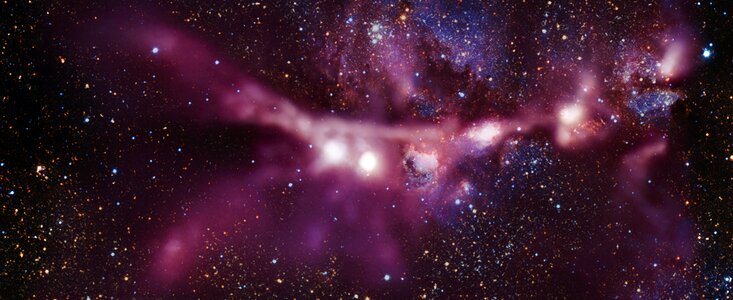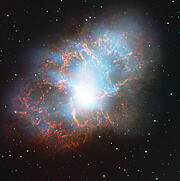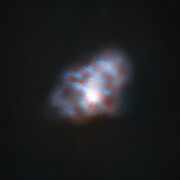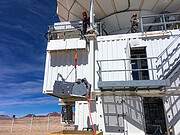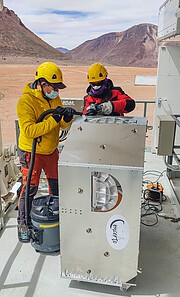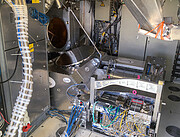Announcement
Let the show begin: APEX’s CONCERTO instrument sees first light
6 July 2021
An exciting new instrument, a spectrometer called CONCERTO, has successfully produced its first observations: test images of the Cat's Paw Nebula and the Crab Nebula. The instrument, installed on the ESO-operated Atacama Pathfinder Experiment (APEX), will help astronomers probe the mysterious, ancient cosmic epoch during which the first stars lit up.
The main goal of CONCERTO, which stands for CarbON CII line in post-rEionisation and ReionisaTiOn epoch, is to study the birth of the first generation of stars. To do so, it will look at cosmic objects that formed between 600 million and 1.2 billion years after the Big Bang. This era, known as cosmic reionisation, is poorly understood yet crucial in the history of the cosmos, as it marks the transition between the “dark ages” — a very obscure period in the life of the Universe in which stars had not formed yet — and the time when the most distant galaxies we see in the Universe today formed. CONCERTO will also map distant galaxy clusters and star-forming regions in our Milky Way.
As an instrument that is able to scan the sky at frequencies between infrared and radio waves, CONCERTO will look at radiation emitted by ionised carbon atoms, one of the most valuable tracers of star formation in the early cosmic ages. “The objective of shedding light on the reionisation period is very hard, as the signal we are searching for is very small,” says CONCERTO’s Principal Investigator Guilaine Lagache from the Laboratoire d’Astrophysique de Marseille, in France. “We will tackle this by using a totally innovative and experimental observing technique, called intensity mapping. CONCERTO will be the first instrument in the world to perform intensity mapping of the primordial carbon radiation on a large field of the sky.”
“CONCERTO is completely unique at APEX,” says ESO Astronomer and APEX Project Scientist Carlos De Breuck. “The other instruments either concentrate on imaging or spectroscopy, but not on both like CONCERTO is doing. And in terms of imaging, with a diameter of about 20 arcminutes on sky, it is by a margin the largest field-of-view ever used at APEX.” The new instrument has replaced the LArge APEX BOlometer CAmera (LABOCA), enabling a four-time improvement in terms of field of view.
CONCERTO’s first light marks the end of its installation process, which started with the delivery of the instrument to the APEX site in the Chanjantor plateau in the Chilean Atacama Desert in late March 2021.
The COVID-19 pandemic posed a considerable challenge to the CONCERTO team, who managed to prepare the instrument for fully remote operations, ship it to Chile, and install it at APEX under strict health and safety conditions. “A large part of this success comes from the team spirit and the fact that we all work with passion and determination,” says CONCERTO’s instrument scientist Alessandro Monfardini from Institut Néel in Grenoble, France. The team is also grateful to the local APEX staff for their dedication and help installing and testing the instrument.
More Information
CONCERTO received funding from the European Research Council under grant agreement No 788212, from the Aix-Marseille Initiative of Excellence (France) and LabEx FOCUS (France). The institutes involved in the CONCERTO consortium are the Laboratoire d’Astrophysique de Marseille (LAM; France), the Institut Néel (France), the Laboratoire de Physique Subatomique et de Cosmologie (LPSC; France), the Institut de Planétologie et d'Astrophysique (IPAG; France) and the Astronomy Instrumentation Group at the University of Cardiff (United Kingdom). The Institut Néel, LPSC and IPAG are laboratories of the Centre National de la Recherche Scientifique (CNRS) and the Université Grenoble Alpes (UGA). LAM is a laboratory of the CNRS and the Aix-Marseille University.
APEX is a collaboration between the Max Planck Institute for Radio Astronomy (MPIfR), the Onsala Space Observatory (OSO) and ESO. Operation of APEX at Chajnantor is entrusted to ESO.
Links
Contacts
Guilaine Lagache
CONCERTO’s Principal Investigator
Laboratoire d'Astrophysique de Marseille
Marseille, France
Tel: +33 6 50 77 35 45
Email: guilaine.lagache@lam.fr
Alessandro Monfardini
CONCERTO’s Instrument Scientist
Institut Néel
Grenoble, France
Tel: +33 4 76 88 10 52
Email: alessandro.monfardini@neel.cnrs.fr
Carlos De Breuck
ESO APEX Project Scientist
Garching bei München, Germany
Tel: +49 89 3200 6613 Email: cdebreuc@eso.org
Bárbara Ferreira
ESO Media Manager
Garching bei München, Germany
Tel: +49 89 3200 6670
Email: press@eso.org
About the Announcement
| Id: | ann21010 |
Our use of Cookies
We use cookies that are essential for accessing our websites and using our services. We also use cookies to analyse, measure and improve our websites’ performance, to enable content sharing via social media and to display media content hosted on third-party platforms.
ESO Cookies Policy
The European Organisation for Astronomical Research in the Southern Hemisphere (ESO) is the pre-eminent intergovernmental science and technology organisation in astronomy. It carries out an ambitious programme focused on the design, construction and operation of powerful ground-based observing facilities for astronomy.
This Cookies Policy is intended to provide clarity by outlining the cookies used on the ESO public websites, their functions, the options you have for controlling them, and the ways you can contact us for additional details.
What are cookies?
Cookies are small pieces of data stored on your device by websites you visit. They serve various purposes, such as remembering login credentials and preferences and enhance your browsing experience.
Categories of cookies we use
Essential cookies (always active): These cookies are strictly necessary for the proper functioning of our website. Without these cookies, the website cannot operate correctly, and certain services, such as logging in or accessing secure areas, may not be available; because they are essential for the website’s operation, they cannot be disabled.
Functional Cookies: These cookies enhance your browsing experience by enabling additional features and personalization, such as remembering your preferences and settings. While not strictly necessary for the website to function, they improve usability and convenience; these cookies are only placed if you provide your consent.
Analytics cookies: These cookies collect information about how visitors interact with our website, such as which pages are visited most often and how users navigate the site. This data helps us improve website performance, optimize content, and enhance the user experience; these cookies are only placed if you provide your consent. We use the following analytics cookies.
Matomo Cookies:
This website uses Matomo (formerly Piwik), an open source software which enables the statistical analysis of website visits. Matomo uses cookies (text files) which are saved on your computer and which allow us to analyze how you use our website. The website user information generated by the cookies will only be saved on the servers of our IT Department. We use this information to analyze www.eso.org visits and to prepare reports on website activities. These data will not be disclosed to third parties.
On behalf of ESO, Matomo will use this information for the purpose of evaluating your use of the website, compiling reports on website activity and providing other services relating to website activity and internet usage.
Matomo cookies settings:
Additional Third-party cookies on ESO websites: some of our pages display content from external providers, e.g. YouTube.
Such third-party services are outside of ESO control and may, at any time, change their terms of service, use of cookies, etc.
YouTube: Some videos on the ESO website are embedded from ESO’s official YouTube channel. We have enabled YouTube’s privacy-enhanced mode, meaning that no cookies are set unless the user actively clicks on the video to play it. Additionally, in this mode, YouTube does not store any personally identifiable cookie data for embedded video playbacks. For more details, please refer to YouTube’s embedding videos information page.
Cookies can also be classified based on the following elements.
Regarding the domain, there are:
- First-party cookies, set by the website you are currently visiting. They are stored by the same domain that you are browsing and are used to enhance your experience on that site;
- Third-party cookies, set by a domain other than the one you are currently visiting.
As for their duration, cookies can be:
- Browser-session cookies, which are deleted when the user closes the browser;
- Stored cookies, which stay on the user's device for a predetermined period of time.
How to manage cookies
Cookie settings: You can modify your cookie choices for the ESO webpages at any time by clicking on the link Cookie settings at the bottom of any page.
In your browser: If you wish to delete cookies or instruct your browser to delete or block cookies by default, please visit the help pages of your browser:
Please be aware that if you delete or decline cookies, certain functionalities of our website may be not be available and your browsing experience may be affected.
You can set most browsers to prevent any cookies being placed on your device, but you may then have to manually adjust some preferences every time you visit a site/page. And some services and functionalities may not work properly at all (e.g. profile logging-in, shop check out).
Updates to the ESO Cookies Policy
The ESO Cookies Policy may be subject to future updates, which will be made available on this page.
Additional information
For any queries related to cookies, please contact: pdprATesoDOTorg.
As ESO public webpages are managed by our Department of Communication, your questions will be dealt with the support of the said Department.
